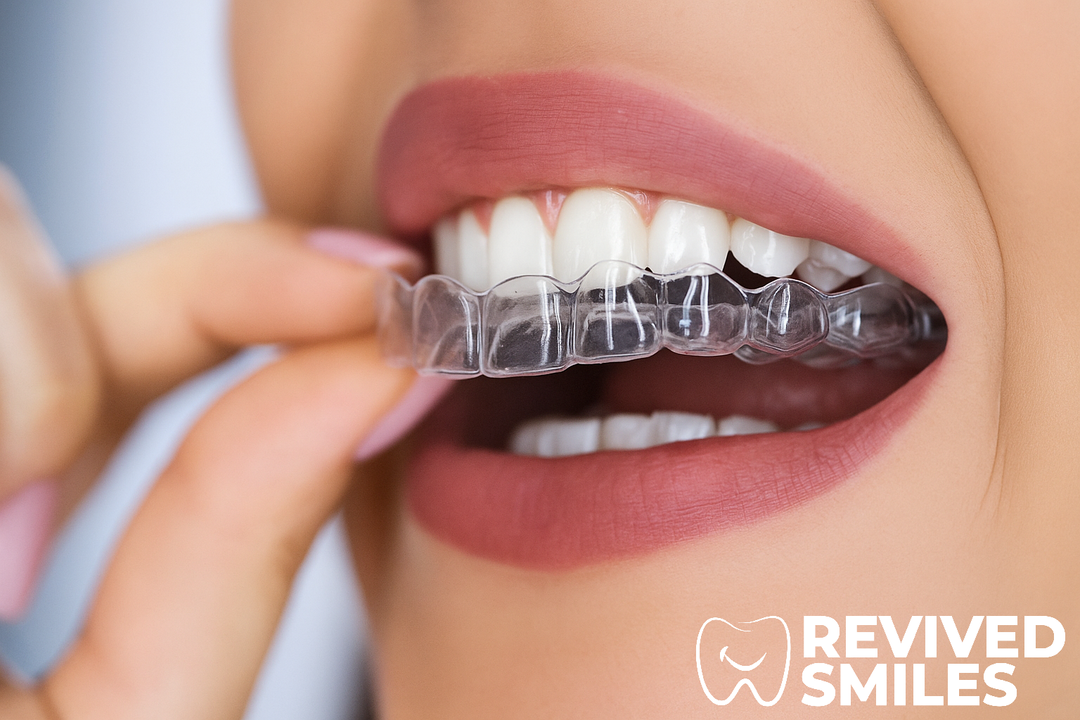Types of Flexible Partial Dentures - What To Know

If you're looking to replace missing teeth, flexible dentures offer a comfortable, natural-looking alternative to traditional acrylic dentures that can help restore your confidence.
Made from lightweight, flexible materials like nylon, they are the most popular choice for their flexibility, durability and look. Whether this is your first experience with dentures or you're considering an upgrade from your current solution, this guide will help you understand the different types of flexible dentures and find the right fit for your needs.
What are Flexible Partial Dentures?
Flexible dentures are partial dentures made from soft thermoplastic materials like nylon. They replace one or several missing teeth—never an entire arch—and flex slightly to hug the contours of your gums. Because the base grips naturally, you don’t need metal clasps or messy adhesives. The translucent material comes in different shades of pink, so it blends with your gum color and feels light and comfortable all day.
Types of Flexible Partial Dentures
Several flexible denture options are available, each designed for specific needs. They’re crafted from different thermoplastic materials, and each choice offers its own blend of comfort, durability, and aesthetics.
1. Valplast Dentures
Valplast is the leading name in flexible partials, known for its natural look and robust build. These dentures are made from a translucent nylon material that looks like gum tissue.
PROs:
-
Natural Look: The material blends in with your gums for a smooth look.
-
Lightweight: For those who want comfort and don’t like the bulk of traditional dentures.
-
Durable: Highly resistant to breakage and wear, so long lasting.
CONs:
-
Limited Adjustability: Once crafted, these dentures have minimal adjustment options, so significant changes typically require creating a new appliance.
-
Investment: While Valplast dentures may have a higher initial cost, their exceptional durability provides long-term value for your investment.
-
Repair Limitations: If the denture cracks or tears, a simple repair usually isn’t possible; you’ll likely need a complete remake.
2. Duraflex Dentures
Duraflex is another well-known brand for flexible partial denture materials, known for its stain resistance and hypoallergenic properties. These dentures are strong and comfortable, a practical choice for many users.
PROs:
-
Stain Resistance: Duraflex dentures resist stains from food and drinks.
-
Hypoallergenic: A good choice for those with sensitivity to traditional denture materials.
-
Comfortable Fit: Provides a snug, no irritation fit for daily wear.
CONs:
-
Limited Adjustability: Like most flexible dentures, cannot be modified post production.
-
Appearance: While comfortable, some users may find them less translucent than Valplast.
3. Flexites Dentures
Flexites are a versatile option in the world of flexible dentures, popular for its adaptability and ease of use. Suitable for those with unique dental structures remaining teeth that require a customized approach. They also provide the most natural-looking gum color match available.
PROs:
-
Custom Fit: Flexites offer flexibility for a custom fit even in complex cases.
-
Lightweight and Comfortable: Excellent daily wear comfort.
-
Durable: Designed to last with proper care.
CONs:
-
Less Common: Not as widely available as Valplast or Duraflex dentures.
-
Specialist Fabrication Required: Expertise from dental professionals is needed to get the best fit.
4. TCS Flexible Dentures
TCS dentures are durable and impact-resistant, made from flexible thermoplastic material, perfect for active lifestyles. Made from biocompatible material, comfortable without compromising strength.
PROs:
-
Impact Resistant: Designed to withstand drops or impacts.
-
Aesthetic Appeal: Like Valplast, TCS dentures blend in with gums for a smooth look.
-
Hypoallergenic: Safe for those with material sensitivity.
CONs:
-
Non-Adjustable: Like most flexible dentures, cannot be adjusted post production.
Flexible Partial Denture Options

Flexible partial dentures are a popular choice for individuals with missing teeth, offering a comfortable and aesthetically pleasing solution.
These dentures are designed to blend seamlessly with your mouth and natural gum tissue, providing a discreet and natural-looking appearance.
There are several options available, each with its own unique benefits:
-
Valplast Partial Dentures: Made from a biocompatible nylon thermoplastic, Valplast partial dentures are renowned for their flexibility and durability. The material is translucent, allowing it to blend in with your natural gum tissue for a more natural look.
-
Duraflex Partial Dentures: Crafted from an ethylene-propylene material, Duraflex partial dentures offer a unique blend of comfort, durability, and aesthetics. They are also stain-resistant and hypoallergenic, making them an excellent choice for individuals with sensitivities to traditional denture materials.
-
TCS Partial Dentures: TCS partial dentures are made from a thermoplastic material that is thin, comfortable, and virtually unbreakable. These dentures are designed to provide a snug fit and are ideal for individuals with active lifestyles.
Each of these options has its own advantages and disadvantages, and the best choice for an individual will depend on their specific needs and preferences.
Consulting with a dental professional can help you determine which type of flexible partial denture is right for you.
Flexible Denture Materials
Flexible denture materials are designed to be comfortable, durable, and aesthetically pleasing. These materials allow the dentures to conform to the shape of your gums, providing a secure and natural fit. Some common materials used in flexible dentures include:
-
Biocompatible Nylon Thermoplastic: This material is used in Valplast & TCS partial dentures and is known for its flexibility and durability. It is also translucent, allowing it to blend seamlessly with your natural gum tissue.
-
Ethylene-Propylene: This material is used in Duraflex partial dentures and offers a unique blend of comfort, durability, and aesthetics. It is also stain-resistant and hypoallergenic, making it a great option for individuals with sensitivities to traditional denture materials.
-
Thermoplastic Materials: These materials are used in TCS partial dentures and are thin, comfortable, and virtually unbreakable. They provide a snug fit and are ideal for individuals with active lifestyles.
When choosing a flexible denture material, it’s essential to consider factors such as comfort, durability, and aesthetics. Consulting with a dental professional can help you determine which material is best suited for your needs.
Benefits of Flexible Dentures
Flexible dentures have many advantages that make them popular for partial denture wearers with missing or damaged teeth. Here’s why:
-
Comfort: The lightweight material is gentle on the gums, so can be worn for longer.
-
Natural Appearance: No metal clasps, flexible dentures look smooth and blend in with gums and natural teeth.
-
Ease of Use: Easy to insert and remove, reduces risk of damage during handling.
-
Durability: Flexible dentures are break resistant and can last for years with proper care.
-
Hypoallergenic Options: TCS and Duraflex are good options for those with allergies or sensitivity to traditional materials.
-
No Adhesive Needed: The flexible base grips naturally, so denture creams are usually unnecessary.
The Cost of Flexible Dentures
The cost of flexible dentures can vary depending on several factors, including the type of material used, the complexity of the case, the patient's teeth, and the location of the dental practice. On average, the cost of flexible dentures can range from $500 to $2000 per arch.
It’s essential to consult with a dental professional to determine the best option for your specific needs and budget. They can help you understand the costs involved and create a treatment plan that meets your needs.
Factors such as the number of missing teeth, the type of flexible denture material, and any additional dental work required can all influence the overall cost.
How to Choose the Right Flexible Denture
Here are the key factors to discuss with your dental professional when choosing the right flexible denture for you:
-
Fit: Each brand has a different fit, so choose one that’s comfortable for daily wear.
-
Appearance: If you want a natural look, Valplast and TCS are good options.
-
Allergies: If you have sensitivity, consider hypoallergenic options like Duraflex or TCS.
-
Budget: Flexible dentures vary in price, so balance cost with quality and longevity.
-
Extent of Tooth Loss: Flexible dentures replace one or several teeth—they aren’t designed to restore a full arch. If you need to replace every tooth on the jaw, ask your dentist about full dentures or implant solutions.
At Revived Smiles, our team can help you evaluate these factors and find the perfect flexible denture solution that fits both your needs and budget, all from the comfort of your home.
Are Flexible Dentures Right for You?
Flexible partials work well if you:
-
have one to nine missing teeth in the same area,
-
keep the rest of your teeth and gums healthy,
-
want a metal-free, natural look,
-
need a lighter, allergy-friendly option.
They may not be your best choice if you need a full denture, have severe bone loss, or place heavy bite pressure on your back teeth. Repairs and major fit changes usually mean making a new denture, which can raise total cost. Talk with your dentist about your bite, budget, and long-term plans before you decide.
Frequently Asked Questions
What Are the Disadvantages of Flexible Dentures?
Flexible dentures cost more than basic acrylic, can’t be relined or repaired easily, and soak up stains if you don’t clean them well. They also flex while you chew, so you get less bite force than with metal-based or implant dentures. For wide tooth gaps or severe bone loss, your dentist may suggest another option.
How Do Flexible Dentures Stay in Place?
The nylon base molds closely to your gums and creates gentle suction. Small, gum-colored clasps hug nearby teeth, adding grip without visible metal. Most wearers don’t need denture adhesive, but your dentist can adjust the fit if you feel movement.
Can You Eat With Flexible Dentures?
Yes. Start with soft foods for a few days, take small bites, and chew on both sides to keep the denture stable. After you adjust, you can enjoy most foods, but avoid very sticky candy or hard nuts that could bend the clasp. Rinse and brush your denture after every meal to prevent stains.
Caring for Flexible Dentures
To keep your flexible dentures in top shape:
-
Clean Regularly: Use a soft-bristle toothbrush and non-abrasive denture cleanser to remove plaque and debris.
-
Avoid Hot Water: High temperatures can warp the material, so always rinse with lukewarm water.
-
Store Properly: When not in use, store dentures in denture solution to keep them flexible and clean.
-
Visit Your Dentist: Regular checkups are crucial to get a proper fit and address any issues with your partial dentures.
Conclusion
Flexible dentures, including Valplast, Duraflex, Flexites, and TCS options, offer an excellent combination of comfort, durability, and natural appearance in dental prosthetics, making them an ideal solution for patients missing one or several teeth. Now you know the differences, talk to your dentist to get the solution for your smile and life.





Leave a comment